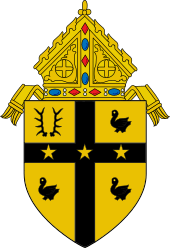University of Detroit Mercy
The University of Detroit Mercy (UDM) is a private, Roman Catholic university in Detroit, Michigan, sponsored by both the Society of Jesus (the Jesuits) and the Religious Sisters of Mercy. Founded in 1877, it is the largest Catholic university in Michigan. It has three campuses, where it offers more than a hundred academic degrees and programs of study in liberal arts, clinical psychology, business, dentistry, law, engineering, architecture, nursing and allied health professions.
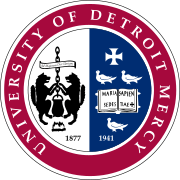 | |
| Latin: Universitas Detroitensis Misericordia | |
Former names | Detroit College (1877–1911) University of Detroit (1911–1990) Mercy College of Detroit (1941–1990) |
|---|---|
| Motto | Ad maiorem Dei gloriam (Latin) Maria, Sedes Sapientiae (Latin) |
Motto in English | For the greater glory of God; Mary, Seat of Wisdom |
| Type | Private university |
| Established | 1877 |
Religious affiliation | Roman Catholic (Jesuit / Sisters of Mercy) |
Academic affiliations | AJCU, ACCU, NAICU |
| Endowment | $69.4 million[1] |
| President | Antoine M. Garibaldi |
Academic staff | 210 full-time, 208 part-time |
| Students | 5,080 |
| Undergraduates | 2,745 |
| Postgraduates | 1,148 |
Other students | 1,187 (professional) |
| Location | , , United States |
| Campus | Urban, 91 acres (36.8 ha) |
| Colors | Red, White, Blue[2] |
| Nickname | Titans |
Sporting affiliations | NCAA Division I: Horizon League, MAAC, SoCon, Midwest Fencing Conference |
| Mascot | Tommy Titan |
| Website | www |
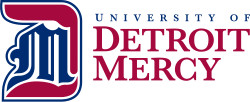 | |
In athletics, the university sponsors 17 NCAA Division I level varsity sports for men and women. It is a member of the Horizon League.
History
University of Detroit Mercy's origin dates back to 1877 with the founding of "Detroit College," near Detroit's downtown, by the Society of Jesus, under the leadership of John Baptist Miège, S.J. The college became the University of Detroit in 1911,[3][4] and in 1927 Fr. John P. McNichols, S.J., the then president of the University of Detroit, established a second campus that ended up being known by its Spanish architecture and large elm trees. In 1941, the Sisters of Mercy opened Mercy College of Detroit. Both schools saw a great deal of success and developed many distinguished alumni.
Notable alumni include political and business leaders such as U.S. senator Gary Peters and former Ford CEO Jim Padilla, both from the University of Detroit. In 1990, despite some opposition, these two institutions consolidated to become "University of Detroit Mercy." Since the merger, the University has produced the likes of actor Keegan-Michael Key and news anchor Allison Payne. The University has a long history of being active in the community and continues to play a major role in the minds, hearts, and lives of Detroiters.
Colleges and campuses
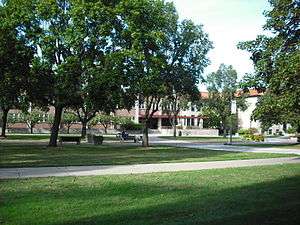
The University of Detroit Mercy comprises seven colleges and schools:
- School of Architecture
- College of Business Administration
- School of Dentistry
- College of Engineering & Science
- College of Health Professions/McAuley School of Nursing
- School of Law
- College of Liberal Arts & Education
The University has three campuses in the city of Detroit:
- The McNichols Campus is at 4001 W. McNichols Road, on the southeast corner of McNichols Road and Livernois Avenue, in northwest Detroit (near the University District, Pilgrim Village and Palmer Woods neighborhoods). The majority of the University's undergraduate and graduate programs are offered on this campus, as well as the University's main administration and athletic facilities like Calihan Hall. It is also the location of all six student residence halls.
- The Riverfront Campus is home to the School of Law in downtown Detroit at 651 East Jefferson (across from the Renaissance Center).
- The Corktown Campus, at 2700 Martin Luther King Jr. Boulevard, has housed the School of Dentistry and Dental Clinic since 2008.
Aside from Detroit Mercy's own campuses, the University offers undergraduate and graduate programs at Macomb University Center[5] in Clinton Township, Mich. Detroit Mercy has also partnered with Aquinas College and St. Mary Mercy Hospital in Grand Rapids, Mich. to offer a Nursing prelicensure program.[6]
A former campus at 8200 West Outer Drive in Detroit was home to Mercy College of Detroit from 1941 until consolidation in 1990.[7] As part of University of Detroit Mercy, the Outer Drive Campus hosted Detroit Mercy's Dentistry Clinic starting in 1997.[8] Detroit Mercy agreed to sell the Outer Drive Campus to WCCCD in 2003,[9] and the Detroit Mercy School of Dentistry and Clinic moved to the Corktown Campus in January 2008.[10]
Institutes, centers, clinics and archives
The University is home to a variety of institutes and centers, clinics providing services to the public, and archives. Examples include:
Law clinics
In 1965 University of Detroit's Urban Law Clinic was one of the first in the country. It is one of the few law schools in the country requiring a practicum course for all students. It has received numerous awards, most recently the ABA Louis M. Brown Award for Legal Access with Meritorious Recognition in 2012 and the ABA Law Student Division's Judy M. Weightman Memorial Public Interest Award in 2006.[11]
Courses selected for the clinic component bring students in contact with the disadvantaged and disenfranchised, giving all law students at Detroit Mercy first-hand experience of social problems relevant to their specialization. In 2003 the clinic acquired a 28-foot-long mobile law office, perhaps the first such facility in the country.[12] In 2012 a downtown building was purchased and renovated for the clinic, bringing the clinic closer to the court buildings.[13] At that time the clinic courses served over 1000 clients a year.[14]
Detroit Mercy Law students must take one regular, semester-long "clinic" course that places them in contact with the underrepresented in an area of their choice, with options covering most specializations. The courses provide them with the skills and knowledge requisite for their clinical work, together with guided reflection and individual contact with the professor, including a comprehensive final interview.[15]
Following are the clinic courses offered at Detroit Mercy, all of which fulfill the student requirement.
- Immigration Law Clinic. This serves immigrants seeking family sponsorship or Special Immigrant Juvenile Status, or advancing Violence against Women Act Petitions. Students represent clients in U.S. Immigration Court; other court experiences are the U.S. Department of Homeland Security, the Board of Immigration Appeals, and the U.S. Court of Appeals for the Sixth Circuit.
- Veterans Law Clinic. Students argue before the Department of Veterans Affairs for disability benefits for veterans.
- Criminal Trial Clinic. This prepares students for all aspects of defense in misdemeanor cases, including courtroom appearances and plea bargaining.
- Juvenile Appellate Clinic. Students argue cases before a panel of attorneys pre-trial and may be asked to argue the case in the Michigan Court of Appeals. Most cases deal with child protection or delinquency.
- Appellate Advocacy Clinic, State Appellate Defender's Office (SADO). SADO was founded to give "legal representation to indigent criminal defendants in post-conviction matters."[16] Students prepare briefs to be delivered before the Michigan Court of Appeals or the Michigan Supreme Court, and may deliver their brief first in "mock arguments" before a panel of attorneys.[15]
- Intellectual Property Law Clinic. Inventors without the resources to defend themselves before the U.S. Patent and Trademark Office can get help from the law students, supervised by patent attorneys. To be eligible for this clinic students must possess an undergraduate degree in some scientific field.[15] In conjunction with the University of Windsor, the course qualifies students in both U.S. and Canadian patent law, the first certified program in that dual area.[17][18][19]
Dental clinics
The School of Dentistry provides several dental and specialty clinics to the community, including a mobile clinic based in a customized RV. Because the clinics are student clinical programs (where student doctors provide treatment under the supervision of licensed faculty dentists), services can be offered at a reduced cost. This affordability makes dental services available to many members of the local community who are otherwise unable to afford dental care.
Detroit Collaborative Design Center
The Detroit Collaborative Design Center (DCDC) is a multi-disciplinary, nonprofit architecture and urban design firm in the School of Architecture. The Center is dedicated to creating sustainable spaces and communities through quality design and the collaborative process.
Institute for North Korean Studies
The Institute for North Korean Studies (INKS) is a United States-based non-partisan, non-proprietary research center founded at the College of Business Administration at the University of Detroit Mercy in April 2004. INKS is distinguished as the first research center in the United States or Europe to focus exclusively on North Korea. INKS organizes seminars and publishes research and monographs in collaboration with McFarland and Company, Inc., Publishers. The international and interdisciplinary academic journal of the center is North Korean Review.[20]
Carney Latin American Solidarity Archive
The Padre Guadalupe Carney Latin American Solidarity Archive (CLASA) contains a collection of Spanish and English books, human rights reports, independent newspapers and newsletters, and social justice papers representing more than 25 years of work by individuals and organizations working in solidarity to aid the people of Latin America.
Black Abolitionist Archive
The Black Abolitionist Archive is a digital collection of over 800 speeches by antebellum African Americans and approximately a thousand editorials from the period, providing a portrait of black involvement in the anti-slavery movement.
Center for Social Entrepreneurship
The Center for Social Entrepreneurship works to develop the capacity of Detroit enterprises that have a social mission, meaning in addition to regular business goals, they aspire to create social good within their community. The Center's main service is the CSE Boost Program, which is an in-person workshop for early-stage social organizations.
Greek life
Fraternities and sororities (in alphabetical order)
- Fraternities – Alpha Phi Alpha, Kappa Delta Rho, Lambda Theta Phi, Omega Psi Phi, Phi Beta Sigma, Phi Kappa Theta, Sigma Pi
- Sororities – Alpha Kappa Alpha, Delta Sigma Theta, Gamma Phi Beta, Kappa Beta Gamma, Sigma Sigma Sigma, Zeta Phi Beta
Athletics
The University of Detroit Mercy sponsors 17 NCAA Division I-level varsity sports teams. Men's and women's Detroit Mercy Titans teams compete in each sport in the Horizon League, except where noted below:
- Basketball
- Cross country
- Fencing (Midwest Fencing Conference)
- Golf
- Lacrosse (men's: Metro Atlantic Athletic Conference; women's: Southern Conference)
- Soccer
- Softball (women's team only)
- Track and field (indoor)
- Track and field (outdoor)
The University also sponsors eight intramural sports.
Detroit Mercy's most recent league championship came in 2019, when the women's softball team won the Horizon League Championship. In 2014, both the women's golf team and men's cross country team earned Horizon League titles for the second straight season. The men's lacrosse team won the MAAC Championship in 2013.
In partnership with WADL-TV, the Detroit Mercy Titans launched its own 24-hour network, the Titan Classic Sports Network, in September 2014.[21]
Basketball
The men's basketball team has consistently contended for the Horizon League title. On June 13, 2018, Detroit Mercy named Mike Davis the 22nd head coach in men’s basketball program history[22]. The NCAA Tournament-tested Davis previously coached at Texas Southern University, where he led the team to four regular season titles, four conference tournament championships and four NCAA Tournament appearances. He led Indiana University to the 2002 NCAA Championship game.
Ray McCallum coached the Detroit Mercy men's basketball team from 2008-2016. He led the Titans to the Horizon League Championship and an NCAA Tournament appearance during the 2011-12 season. McCallum's predecessor, Perry Watson, led a successful program at Detroit's Southwestern High School before coming to Detroit Mercy after some years as an assistant coach at the University of Michigan and maintained strong recruiting ties within the city's public league. Watson guided Detroit Mercy to 10 winning seasons, three league titles, two NCAA Tournament appearances and an NIT Final Four during his 15 years with Detroit Mercy. The Titans' two NCAA appearances also included victories over St. John's and UCLA. Between 1997-98 and 2000–01, the Titans had four straight 20-victory seasons.[23]
Dick Vitale, ESPN's most well-known college basketball commentator, was the University of Detroit men's basketball head coach for four seasons (1973–1977) before becoming the school's Athletics Director for 1977-78. The following year he left to coach the Detroit Pistons. In his final year as a college head coach in 1977, Vitale led the Titans to a school record 25 victories and the Round of 16 in the 1977 NCAA Tournament before losing to Michigan, 86-81. Vitale ended up with a 78-30 career record as head coach of the Titans. Vitale went on to coach the Detroit Pistons before beginning his broadcasting career with ESPN in 1979 and was the color commentator for the first college basketball game carried by the new network. As its lead college basketball analyst, he helped make the network an integral part of the game's popularity. An author of six books chronicling his love affair with basketball, Vitale received the Basketball Hall of Fame's Curt Gowdy Media Award (1998), won the NABC Cliff Wells Appreciation Award in 2000 and was inducted to the College Basketball Hall of Fame in 2008.[24] In 2011, Detroit Mercy named its basketball court at Calihan Hall in his honor.[25]
Highlights from the Detroit Mercy Titans men's and women's basketball teams include appearances in the 2011-12 postseason. The women's basketball team participated in the WNIT Tournament for the first time ever and finished with its first 20-win season (20-14) since 1997, when the team made its only NCAA Tournament appearance. The men's basketball team captured the 2011-12 Horizon League Championship and reached the NCAA Tournament for the sixth time in its history and first since 1999.[26]
Detroit Mercy has been a host institution for several NCAA Tournament men’s basketball games. The University hosted the 2008 NCAA Midwest Regional and 2009 NCAA Final Four, played at Ford Field, as well as the 2018 NCAA First and Second Round games, played at Little Caesar’s Arena. In 2021, Detroit Mercy and Oakland University will team up to co-host the 2021 NCAA First and Second Round games, scheduled to be played at Little Caesar’s Arena[27].
All home basketball games feature the Titan Pep Band.
Football
Detroit Titans football was played from 1896 to 1964. The team staked a claim to college football's national championship with a 9-0 record in 1928. Gus Dorais, coach of the Titans from 1925–42, was inducted in the College Football Hall of Fame in 1954. He also coached the NFL's Detroit Lions.
Notable people
University of Detroit Mercy and its predecessor institutions have graduated or employed many notable people over the years. See the main article for some examples:
Photo galleries
McNichols Campus
 World War I Memorial Clock Tower
World War I Memorial Clock Tower Fisher Fountain
Fisher Fountain Student Fitness Center
Student Fitness Center Lille B. Kassab Mall in 2012
Lille B. Kassab Mall in 2012 Campus seen from northeast parking lot
Campus seen from northeast parking lot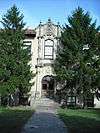 Warren Loranger Architecture Building
Warren Loranger Architecture Building Chemistry Building
Chemistry Building.jpg) Chemistry Building detail
Chemistry Building detail Ford Life Sciences Building
Ford Life Sciences Building Engineering Building detail
Engineering Building detail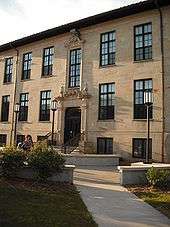 Commerce & Finance Building ("C&F")
Commerce & Finance Building ("C&F") College of Health Professions
College of Health Professions Lansing Reilly Hall - Jesuit Residence
Lansing Reilly Hall - Jesuit Residence Lansing-Reilly Hall detail
Lansing-Reilly Hall detail Holden hall
Holden hall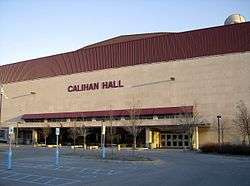 Calihan Hall main entrance
Calihan Hall main entrance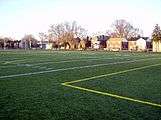 Athletic field and track
Athletic field and track Athletic Field
Athletic Field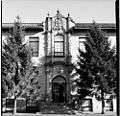 West side of Warren Loranger Architecture Building
West side of Warren Loranger Architecture Building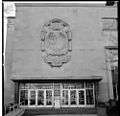 Library on McNichols Campus has a cartouche by Corrado Parducci
Library on McNichols Campus has a cartouche by Corrado Parducci Calihan Hall from southwest, before 2011-2012 renovations
Calihan Hall from southwest, before 2011-2012 renovations
Corktown Campus (School of Dentistry)
 School of Dentistry clinic stations
School of Dentistry clinic stations Detroit Mercy Corktown Campus
Detroit Mercy Corktown Campus
Riverfront Campus (School of Law)
 Detroit Mercy School of Law, in the shadow of the Renaissance Center
Detroit Mercy School of Law, in the shadow of the Renaissance Center Courtyard view, showing Ss. Peter & Paul Jesuit Church's cross and the General Motors logo
Courtyard view, showing Ss. Peter & Paul Jesuit Church's cross and the General Motors logo Detroit Mercy's Asher Law Clinic Center entrance
Detroit Mercy's Asher Law Clinic Center entrance Detroit Mercy's Kresge Law Library
Detroit Mercy's Kresge Law Library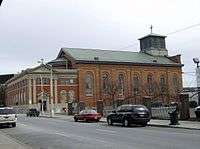 School of Law is beside Ss. Peter & Paul Jesuit Church
School of Law is beside Ss. Peter & Paul Jesuit Church
See also
- Detroit Collaborative Design Center of the University of Detroit Mercy
- Roman Catholic Archdiocese of Detroit
- University of Detroit Jesuit High School and Academy had a common early history with the University.
- Detroit Titans track and field
- Detroit Mercy Titans
References
- Endowment according to University Financial Report of June 30, 2019.
- "University Identity Standards | University of Detroit Mercy". udmercy.edu. July 1, 2015. Archived from the original on April 2, 2016. Retrieved April 13, 2016.
- David Lee Poremba (2001). Detroit in Its World Setting: A Three Hundred Year Chronology, 1701-2001. Wayne State University Press. pp. 157–. ISBN 0-8143-2870-9.
- "Detroit College Now University". Detroit Free Press. January 15, 1911. p. 5. Missing or empty
|url=(help) - "Programs at the Macomb University Center". University of Detroit Mercy website. University of Detroit Mercy. Archived from the original on April 13, 2014. Retrieved April 9, 2014.
- Baiardi, Janet (September 28, 2013). "Mercy Heritage Day remarks". Detroit Mercy College of Health Professions website. University of Detroit Mercy. Archived from the original on April 13, 2014. Retrieved April 9, 2014.
- Muller, S.J., Herman; Sabourin, RSM, Mary Justine; Cohen, Shari S. (2003). Legacy of Excellence: A Continuing History of Jesuit and Mercy Higher Education in Detroit. University of Detroit Mercy. p. 243.
- Muller, S.J., Herman; Sabourin, RSM, Mary Justine; Cohen, Shari S. (2003). Legacy of Excellence: A Continuing History of Jesuit and Mercy Higher Education in Detroit. University of Detroit Mercy. p. 269.
- Peller, Laurie (Spring 2004). "Inside View: Vision 2020". Spiritus: The University of Detroit Mercy Magazine. 11 (2): 8.
- "History of the School of Dentistry". Detroit Mercy School of Dentistry website. University of Detroit Mercy. Archived from the original on April 13, 2014. Retrieved April 9, 2014.
- "PreLaw - Winter 2014". www.nxtbook.com. Archived from the original on September 27, 2017. Retrieved September 26, 2017.
- Michigan Bar Journal. Accessed 25 April 2016. Archived November 15, 2012, at the Wayback Machine
- Law school downtown clinics. Accessed 30 September 2016. Archived February 7, 2012, at the Wayback Machine
- Building for Center. Accessed 25 April 2016. Archived August 6, 2016, at the Wayback Machine
- Clinics. Accessed 25 April 2016. Archived April 13, 2016, at the Wayback Machine
- "SADO - SADO - History and Governance". www.sado.org. Archived from the original on September 27, 2017. Retrieved September 26, 2017.
- Windsor. Accessed 25 April 2016. Archived May 30, 2016, at the Wayback Machine
- "preLaw Magazine - Winter 2007". www.nxtbook.com. Archived from the original on September 27, 2017. Retrieved September 26, 2017.
- "preLaw - Spring 2016 - 47". www.nxtbook.com. Archived from the original on September 27, 2017. Retrieved September 26, 2017.
- “Institute for North Korean Studies (INKS).” College of Business Administration. University of Detroit Mercy. Archived May 12, 2008, at the Wayback Machine June 9, 2008.
- "Titan Classic Sports Network Launches on Labor Day". DetroitTitans.com. University of Detroit Mercy. Archived from the original on October 29, 2015. Retrieved September 8, 2015.
- Paul, Tony. "Mike Davis hired by Detroit Mercy; news conference Thursday". Detroit News. Retrieved June 16, 2020.
- "Titan Basketball Detroit All-Time Scores" (PDF). detroittitans.com. University of Detroit Mercy. Retrieved August 15, 2013.
- "Hall of Fame Class of 2008". collegebasketballexperience.com. The College Basketball Experience. Archived from the original on March 14, 2012. Retrieved December 14, 2012.
- "It was Awesome, baby, with a capital A!". detroittitans.com. University of Detroit Mercy. Archived from the original on February 8, 2012. Retrieved December 14, 2012.
- "Detroit captures men's basketball championship". horizonleague.org. Horizon League. Archived from the original on March 10, 2012. Retrieved December 13, 2012.
- "Little Caesars Arena granted an unprecedented four NCAA events". NHL.com. Retrieved June 16, 2020.
Further reading
- Muller, Herman Joseph (1976). The University of Detroit 1877-1977: A Centennial History. University of Detroit. ASIN B0006CVJ4S.
- Sabourin, Mary Justine (1999). Risk & Hope: An Early History of Mercy College of Detroit, 1941-1966. Detroit, Mich.: Sisters of Mercy of the Americas, Regional Community of Detroit, in cooperation with University of Detroit Mercy.
External links
| Wikimedia Commons has media related to University of Detroit Mercy. |
.svg.png)
